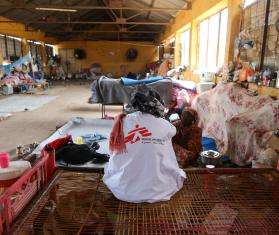As a result of its worst cholera epidemic in recent memory, Zimbabwe declared a national emergency in early December. Cholera rapidly spread throughout Zimbabwe’s provinces and then into neighboring countries, particularly South Africa. According to the South African Department of Health, there have been more than 900 suspected cases. Recently South African authorities in the northern province of Limpopo declared Vhembe district, which borders Zimbabwe, a disaster area.
In response to the cholera outbreak, Doctors Without Borders/Médecins Sans Frontières (MSF) immediately reinforced teams already present in Musina town in Vhembe district, and also in Johannesburg, shifting from providing basic primary healthcare for Zimbabweans to prioritizing cholera case detection and treatment as well as hygiene promotion. MSF diagnoses people with suspected cholera in accordance with the South African case definition, treats moderate patients and refers severely ill patients to the Department of Health.
“Every day, thousands of Zimbabweans cross the Limpopo River to reach South Africa, risking their lives in order to flee the situation in Zimbabwe,” said Rachel Cohen, head of mission for MSF in South Africa. “Along with local authorities, we will need to be particularly vigilant in the coming days and weeks – during the Christmas holidays there is typically a marked increase in people crossing over the border and the approaching rainy season can increase the risk of cholera.”
MSF runs a daily mobile medical clinic at the “Showground” in Musina – an open space in the border-town where conditions are harsh and unhygienic and where more than 1,000 Zimbabweans gather each day to apply for asylum. MSF also has three additional mobile medical teams who work on farms, villages and in other high-risk areas in and around Musina.
“We’ve been working for a year near the border in Musina and also in central Johannesburg to provide basic healthcare for Zimbabweans,” said Cohen. “The cholera outbreak has highlighted the plight of Zimbabweans seeking refuge in South Africa and is shining the spotlight on the urgent need to ensure appropriate assistance and protection for this vulnerable population.”
In Johannesburg, MSF is also addressing the cholera outbreak through its clinic at the Central Methodist Church, where each night approximately 2,000 refugees, asylum-seekers and migrants gather both inside the Church and outside on the pavement. Together with the Church community and local authorities, medical teams are working hard to reduce the risk of a serious cholera outbreak in and around the Church. MSF has also organized hygiene promotion teams to run information and education campaigns about cholera in high-density, high-risk areas in Johannesburg’s Central Business District.
“Cholera deaths can easily be prevented by rapid treatment,” said Dr Gilles van Cutsem, medical coordinator for MSF in South Africa. “The quicker you act, the better the chance of survival. Most people can be cured if you give them oral rehydration salts to replace lost fluids, though more severe cases may require intravenous fluids. To prevent transmission in a cholera outbreak it’s also vital to ensure people have access to clean chlorinated or boiled water and that everyone follows strict hand-washing and hygiene rules.”
In addition to providing medical care at its clinic, MSF installed 10 latrines outside the Church, set up a number of hand-washing points for Church residents, provided hygiene training to food vendors and organized a daily cleaning routine with a team of people living in the Church to reduce the risk of cholera transmission. Training community leaders to actively screen for signs and symptoms of cholera has been an important component of MSF’s response. They rapidly identify and refer any suspected cases to the MSF clinic, where they are stabilised. As in Musina, severe cases are referred to the Department of Health.
MSF has been working in Musina and Johannesburg since December 2007 and in South Africa since 1999.



